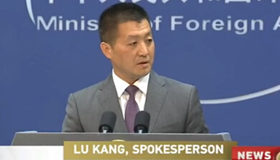BEIJING, Nov. 9 (Xinhua) -- Experts on the Chinese mainland have said that an interpretation of the Basic Law of Hong Kong Special Administrative Region (SAR) is in line with the Constitution and the Basic Law, and is as legally binding as the Basic Law itself.
"As a permanent organ under the country's top legislature, the National People's Congress (NPC) Standing Committee has the power to interpret any national law or legal issue within it when necessary," said Li Shuzhong, vice president of the China University of Political Science and Law.
On Monday, China's top legislature adopted an interpretation of Article 104 of the Basic Law of Hong Kong SAR, clarifying the implications and requirements of the oaths taken by legislators-elect.
The interpretation was issued following the behavior of a handful of legislators-elect during the election of Hong Kong's Legislative Council (LegCo) and the subsequent swearing-in ceremony. These individuals had publicly voiced support for "Hong Kong independence," intentionally violated the oath and insulted the Chinese nation.
Li stressed that the interpretation is authoritative, and the procedure is "appropriate, lawful and indisputable."
According to Zou Pingxue, a Hong Kong Basic Law expert with Shenzhen University, both the Constitution and the Basic Law contain stipulations allowing the NPC to interpret all articles in the Basic Law, even if it is not related to a lawsuit. It can do so voluntarily or upon request from the Hong Kong's Court of Final Appeal.
"Such an interpretation has the final and supreme effect, and Hong Kong courts must abide by it," Zou added.
Refuting claims that the interpretation harms the region's judicial independence, professor Guo Tianwu with Sun Yat-sen University noted that judicial independence for Hong Kong courts means independent management of specific cases without interference, and the NPC's interpretation offers basis for their handling of cases in line with the Basic Law and does not run counter to such independence.
"The legislators-elect touting 'Hong Kong independence' have violated Article 104 of the Basic Law requiring legislators to be politically loyal. According to the Basic Law, their titles are no longer valid, no matter whether they have been sworn in," said Qiang Shigong, professor with Peking University.
Experts agree that the interpretation will help courts and various walks of life in Hong Kong to better understand and follow the Basic Law, and is also beneficial for the safeguarding of national interests in sovereignty, security and development, as well as Hong Kong's basic interests and rule of law.










